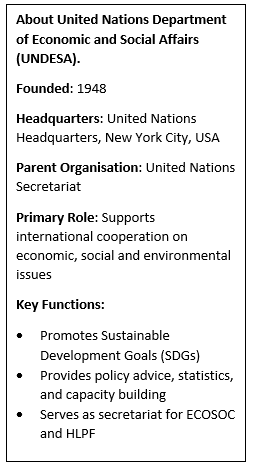Syllabus
GS 2: Bilateral, regional and global groupings and agreements involving India and/or affecting India’s interests.
Context: Recently, Finance minister Nirmala Sitharaman addressed the 4th International Conference on Financing for Development (FFD4).
More on the news:

- The conference was organised by organised by the United Nations Department of Economic and Social Affairs (UNDESA) in Seville, Spain.
- FfD4 is being held to mark the 80th anniversary of the United Nations (UN).
- Leaders began the conference by urging debt relief, fair representation and stronger support for working together globally.
- The outcome document gives an opportunity to align global finance with sustainability goals but its success depends on how well it is put into action.
Key highlights from FfD4
- The conference adopted a renewed global framework called the Sevilla Commitment to tackle the $4 trillion annual financing gap for Sustainable Development Goals (SDGs) in developing countries.
- Agreed upon by consensus, the Sevilla Commitment is the first inter-governmental financing for development framework since 2015.
- It builds on earlier frameworks, including the Monterrey Consensus (2002), Doha Declaration (2008), Addis Ababa Action Agenda (2015) and the Pact for the Future.
- The conference set four main goals to boost sustainable development:
- Close the funding gap for the UN’s Sustainable Development Goals (SDGs),
- Reform global financial institutions to match current global realities,
- Build trust and transparency, and
- Tackle shared challenges like unilateralism and corruption.
- According to official data, the institution has raised \$250 billion through bonds but this amount is still not enough to meet the financial needs.
Response from Countries
- Developing countries demanded fair access to finance, urgent debt relief and stronger representation in global financial decisions.
- It came with a focus on both the quantity and quality of financial support.
- African and LDC voices, like Angola and Nepal, highlighted the need for a new financial model, full participation in global decision-making.
- It also noted that while global GDP increased, debt and digital divides in poorer countries have worsened.
- Countries like Kenya, Tanzania, Mozambique and Honduras stressed the importance of sovereign debt reform, fair credit ratings, regional banks for green growth, blended finance and justice-based financial systems to support MSMEs.
- Islamic Republic and Sudan called for innovative financial tools, stronger international cooperation, and meaningful global partnerships to bridge resource gaps and build resilience.
- The European Union, France, Portugal, Poland, and Estonia promoted a mix of public, private and domestic finance, domestic tax mobilisation, joint investment platforms and global tax reforms to support vulnerable nations like LDCs and SIDS.
Significance of the Conference
- Widespread agreement emerged on the urgent need to reform global financial institutions like the IMF, World Bank and credit rating agencies to better reflect current global economic realities.
- Sovereign debt relief remained a central concern, especially for developing countries and LDCs, which are facing increasing debt burdens despite global economic growth.
- Domestic resource mobilisation (such as better tax systems and national ownership of policies) was highlighted as essential for long-term financial independence and development.
- Countries like Kenya, Tanzania, Mozambique and Honduras pushed for fair credit ratings, regional banks, blended finance.
- It aimed justice-based financing to support vulnerable sectors like MSMEs and the green economy.
- Developed countries and the EU promoted a mix of public, private and domestic finance, called for global tax reforms.
- It also proposed platforms for joint investments and technical cooperation.
- With the adoption of the Compromiso de Sevilla, a political opportunity emerged to align global finance with sustainable development goals.
- However, its real impact will depend on strong and effective implementation during and after the FfD4 talks.
Mains Question
Discuss the significance of the Sevilla Commitment adopted at the FfD4 conference in addressing the global SDG financing gap. How does it build upon previous international frameworks for financing sustainable development? (15M, 250W)

